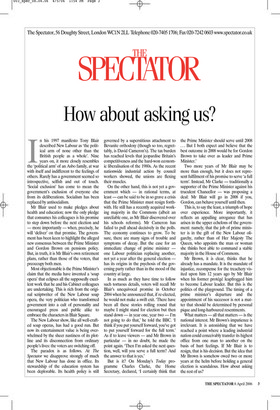How about asking us?
In his 1997 manifesto Tony Blair described New Labour as ‘the political arm of none other than the British people as a whole’. Nine years on, it more closely resembles the ‘political arm’ of an Asbo family, at war with itself and indifferent to the feelings of others. Rarely has a government seemed so introspective, selfish and out of touch. ‘Social exclusion’ has come to mean the government’s exclusion of everyone else from its deliberations. Socialism has been replaced by antisocialism.
Mr Blair used to make pledges about health and education; now the only pledge that consumes his colleagues is his promise to step down before the next election and — more importantly — when, precisely, he will ‘deliver’ on that promise. The government has been keen to highlight the alleged new consensus between the Prime Minister and Gordon Brown on pensions policy. But, in truth, it is Mr Blair’s own retirement plans, rather than those of the voters, that preoccupy both men.
Most objectionable is the Prime Minister’s claim that the media have invented a ‘soap opera’ that eclipses all the supposedly excellent work that he and his Cabinet colleagues are undertaking. This is rich from the original scriptwriter of the New Labour soap opera, the very politician who transformed government into a cult of personality and encouraged press and public alike to embrace the characters in Blair Square.
The New Labour show, like all well-crafted soap operas, has had a good run. But now its entertainment value is being overwhelmed by the sheer nastiness of its plotline and its disconnection from ordinary people’s lives: the voters are switching off.
The paradox is as follows. At The Spectator we disapprove strongly of much that New Labour has done in office. Its stewardship of the education system has been deplorable. Its health policy is still governed by a superstitious attachment to Bevanite orthodoxy (though so too, regrettably, is David Cameron’s). The tax burden has reached levels that jeopardise Britain’s competitiveness and the hard-won economic liberalisation of the 1980s. As the recent nationwide industrial action by council workers showed, the unions are flexing their muscles.
On the other hand, this is not yet a government which — in rational terms, at least — can be said to be in so grave a crisis that the Prime Minister must resign forthwith. He still has a recently acquired working majority in the Commons (albeit an unreliable one, as Mr Blair discovered over his schools reforms). Mr Cameron has failed to pull ahead decisively in the polls. The economy continues to grow. To be sure, there are many signs of trouble and symptoms of decay. But the case for an immediate change of prime minister one Labour politician replacing another, not yet a year after the general election has its origins in the psychosis of the governing party rather than in the mood of the country at large.
In as much as they have time to follow such tortuous details, voters will recall Mr Blair’s unequivocal promise in October 2004 when he announced that, if re-elected, he would not make a swift exit. ‘There have been all these stories rolling round that maybe I might stand for election but then stand down — in year one, year two — I’m not going to do that,’ he told the BBC. ‘I think if you put yourself forward, you’ve got to put yourself forward for the full term.’ As if to leave viewers — and Mr Brown in particular — in no doubt, he made the point again. ‘Then I’m asked the next question, well, will you serve a full term? And the answer to that is yes.’ But is it? On Monday’s Today programme Charles Clarke, the Home Secretary, declared, ‘I certainly think that the Prime Minister should serve until 2008 ... But I both expect and believe that the best outcome in 2008 would be for Gordon Brown to take over as leader and Prime Minister.’ Two more years of Mr Blair may be more than enough, but it does not represent fulfilment of his promise to serve ‘a full term’. Instead, Mr Clarke — traditionally a supporter of the Prime Minister against his truculent Chancellor — was proposing a deal: Mr Blair will go in 2008 if you, Gordon, can behave yourself until then.
This is, to say the least, a triumph of hope over experience. More importantly, it reflects an appalling arrogance that has arisen in the upper echelons of the government: namely, that the job of prime minister is in the gift of the New Labour oligarchy, rather than of Her Majesty The Queen, who appoints the man or woman she thinks best able to command a stable majority in the House of Commons.
Mr Brown, it is clear, thinks that he already has a mandate. It is the mandate of injustice, recompense for the treachery visited upon him 12 years ago by Mr Blair when his former protégé leapfrogged him to become Labour leader. But this is the politics of the playground. The timing of a prime minister’s departure and the appointment of his successor is not a matter that should be determined by personal pique and long-harboured resentments.
What matters — all that matters — is the national interest. Mr Brown’s impatience is irrelevant. It is astonishing that we have reached a point where a leading industrial nation could conceivably transfer its highest office from one man to another on the basis of hurt feelings. If Mr Blair is to resign, that is his decision. But the idea that Mr Brown is somehow owed two or more years at the helm before holding a general election is scandalous. How about asking the rest of us?










































































 Previous page
Previous page